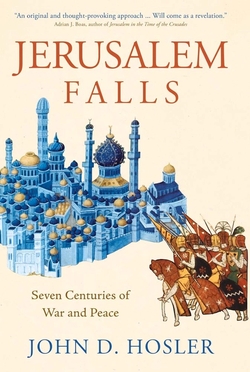 Hosler, one of a dying breed of military historians (he teaches at the U.S. Army's Command and General Staff College in Leavenworth, Kansas), looks at the much-studied city of Jerusalem through an original lens: by giving as much weight to the times between wars as to the wars. He finds a hopeful message from long-ago times. "Real accord between bitter religious enemies was reached in the Middle Ages, and not just once but multiple times across centuries, in diverse contexts and in the midst of near-constant warfare."
Hosler, one of a dying breed of military historians (he teaches at the U.S. Army's Command and General Staff College in Leavenworth, Kansas), looks at the much-studied city of Jerusalem through an original lens: by giving as much weight to the times between wars as to the wars. He finds a hopeful message from long-ago times. "Real accord between bitter religious enemies was reached in the Middle Ages, and not just once but multiple times across centuries, in diverse contexts and in the midst of near-constant warfare."
Jerusalem Falls covers a tempestuous 630 years, from the Iranian conquest in 614 ce to the final medieval Muslim seizure in 1244. (After that, it remained fairly quietly under Muslim control for 673 years, until the British took it in 1917 and a new tempestuous era began.) Through the many attacks (Hosler counts 19 of them; in a subsequent interview, he mentions having discovered one more, making 20 in all), "a general theme of religious concord and toleration can be found in the story of Jerusalem's medieval sieges." Indeed, this discovery lies behind the book's writing: "the positive elements born from such a rough tolerance have been almost wholly de-emphasized in modern histories of the period and in modern political discourse in general. Rather, previous treatments have tended to imagine the past as a story of the unending, and unendable, clash of civilizations."
Of the many conquests, this reviewer found that of 1229 the most interesting, partly because of its general obscurity, partly because of its lasting significance. Hosler argues that actions by the city's conqueror in 1229, the Holy Roman Empire's Frederick II, "have resounded through the last eight hundred years." That is because Frederick "confirmed a running political-religious tradition that had been established in the seventh century and maintained in various formulations thereafter: Muslim prayer on the Temple Mount, Christian prayer in the Church of the Holy Sepulchre, and a tolerated, piecemeal Jewish presence in the city at large."
So it is, Hosler concludes, that "medieval conquests, which seem so far removed from the vicissitudes of the modern Middle East, left an indelible stamp on Jerusalem's present status."